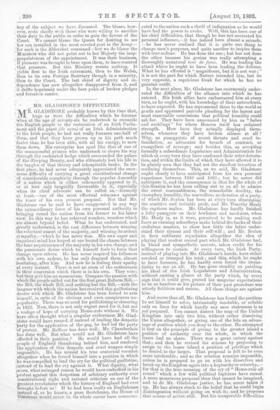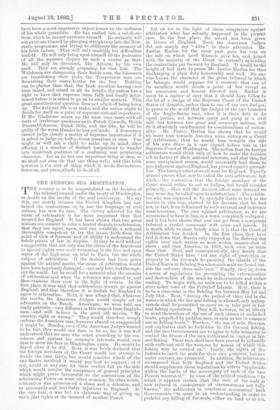' MR. GLADSTONE'S DIFFICULTIES.
MR. GLADSTONE probably knows by this time that, huge as were the difficulties which he foresaw -when at the age of seventy-six he undertook to reconcile the English people to the restoration of an Irish Parlia- ment and the grant (de novo) of an Irish Administration to the Irish people, he had not really foreseen one-half of them, and that they have grown up in his path much faster than he has been able, with all his energy, to mow them down. His enterprise has sped like that of one of the unsuccessful princes who undertook to cleave his way through the enchanted hedge which surrounded the palace of, the Sleeping Beauty, and who ultimately lost his life in the tangles of that thorny and inhospitable brake. In the first place, he had never adequately appreciated the enor- mous difficulty of carrying a great constitutional change of considerable complexity through the popular Assembly of a nation which is either vehemently opposed to it, or at best only languidly favourable to it, especially when its chief advocate can be called ass—formerly at least,—one of the most effectual witnesses against the tenor of his own present proposal. Not that Mr. Gladstone can be said to have exaggerated in any way the extraordinary force of his own personal authority in bringing round the nation from his former to his latter view. In this way he has achieved wonders, wonders which are almost beyond belief. What he has underrated, and greatly underrated, is the vast difference between winning the reluctant assent of the majority, and winning its ardent sympathy,—which he has never won. His own eager and impatient mind has leaped at one bound the chasm between the bare acquiescence of the majority in his own change, and the passionate desire which he himself feels to force that change upon others. He has never inspired his followers with his own ardour, he has only dragged them, almost hesitating, after him. And now he is feeling their apathy at every instant. There is not an atom of the enthusiasm in their conversion which there is in his own. They vote ; but they give him no momentum. Compare the passion with which the people called out for the first great Reform Bill,— the Bill, the whole Bill, and nothing but the Bill,—with the languor with which the nation has received this guillotining decree with, which Mr. Gladstone has been forced to arm himself, in spite of its obvious and even conspicuous un- poptilarity. There was no need for guillotining or closuring in 18332. Now, there is not only urgent need for it, but not 'a vestige of hope of carrying Home-rule without it. We have often thought what a singular enthusiasm Mr. Glad- stone would have roused, if instead of leading the despotic 'party for the application of the gag, he had led the party of protest, Mr. Balfour has done well ; Mr. Chamberlain has done well. But what would not Mr. Gladstone have effected in their position ? He would have had all the people of England thundering behind him, and rendered the application of this despotic and cruel weapon simply impossible. , He has missed his true oratorical vocation altogether when he forced himself into a position in which he was compelled to lead the cry for the political guillotine, iinstead of to lead the cry against it. What dignity, what scorn, what outraged reason he would have embodied in his ;protest against this despotism of arbitrary authority over constitutional right and rational criticism on one of the greatest, revolutions which the history of England had ever -brought before us ! If he had been really an Englishman instead of, as he boasts, a pure Scotchman, the House of Commons would never in its whole career have communi- cated to the nation such a thrill of indignation as he would have had the power to evoke. Well, this has been one of his chief difficulties, that though he has not overrated his personal influence,—it has indeed been almost a miracle, —he has never realised that it is quite one thing to change men's purposes, and quite another to inspire them with true ardour. He has done the one ; but has not done the other because his genius was really attempting a thoroughly unnatural lour de force. He was leading the attack where he ought to have been leading the defence. What he has effected is " magnificent, but it is not war ; " it is not the part for which Nature intended him, but its very opposite, a capricious freak for which he has no genuine outfit.
In the next place, Mr. Gladstone has enormously under- rated the difficulties of the alliance into which be has entered. His Irish allies have embarrassed him at every turn, as he ought, with his knowledge of their antecedents, to have expected. He has represented them to the world as gentle and oppressed patriots pleading for the barest and most reasonable concessions that political humility could ask for. They have been announced by him as " babes and sucklings ' for whom Heaven itself has ordained strength. How have they actually displayed them- selves, whenever they have broken silence at all ? Why, as panegyrists of secret threats and cruel in- timidation, as advocates for breach of contract, as evangelists of revenge ; and besides this, as accepting formally a subordinate Legislature and Administration for which at every turn they have confessed their utter detesta- tion, and within the limits of which they have allowed it to be, plainly seen that they bad not the smallest intention of confining themselves. This, as we said, Mr. Gladstone ought clearly to have anticipated from his own personal experience between 1880 and 1885 ; but he never did anticipate it, and the consequence is that for the whole of this Session he has been calling out to us all to admire the sweet reasonableness, the remarkable docility, the exemplary humility, the marvellous moderation of a party, of which Mr. Sexton has been at &very turn illustrating the sensitive and irritable pride, and Mr. Timothy Healy the captious malice. Mr. Gladstone has hardly finished. a lofty panegyric on their lowliness and meekness, when Mr. Healy is, as it were, perceived to be making such faces as cunning schoolboys make behind the backs of their credulous masters, to show how little the latter under- stand their slyness and their self-will ; and Mr. Sexton in fiery outbursts repudiates altogether the idea of playing that modest second part which Mr. Gladstone had, in bland and sympathetic accents, taken credit for his willingness to sustain. At every turn, the Irish Party, instead of playing into Mr. Gladstone's hands, have either revoked or trumped his trick ; and this, which he ought to have foreseen, he has hardly even found, the impar- tiality to see at s.11. He has gone steadily on painting his ideal of the Irish Legislature and Administration, without casting a glance at the party which, by every sign that it could give, proved his sanguine expectations to be as baseless as his picture of their past procedure was utterly fictitious and untrue. All these things are against him.
And worse than all, Mr. Gladstone has found the problem he set himself to solve, intrinsically insoluble, or soluble only on lines for which hardly any sane statesman is as yet prepared. You cannot dissect the map of the United Kingdom into only two bits, without either dissolving the Union altogether, or giving one of the bits an advan- tage of position which you deny to the other. He attempted it first on the principle of giving to the greater island a position of authority over the whole, in which the lesser had no share. There was a great outcry against that ; and then he revised his scheme by proposing to assign to the lesser island a position of privilege which he denied to the larger. That proposal is felt to be even more intolerable ; and so the solution remains impossible, unless he is prepared to go on with his dissection and break up the Kingdom again into a heptarchy or octarchy,— for that is the true meaning of the cry of "Home-rule all round" which a few wild political logicians have raised. A more monstrous proposal than that cannot be imagined, and to do Mr. Gladstone justice, he has never taken it up. He has always stuck to the belief that he could. begin disintegration without going on with it ; and he proposes that course of action still. But his insuperable difficulties have been a most impressive object-lesson on the rashness of his whole procedure. He has rushed into a cul-de-sac from which he cannot extricate himself. He certainly will not extricate himself by plunging straightway into the New- castle programme, and trying to obliterate the memory of his Irish failure. That will only multiply his difficulties tenfold. He will only bring upon himself all the jealousies of all the separate cliques by such a course as that. He will only be devoured, like Actaeon, by his own pack. They are already preparing for that feat. The Welshmen are sharpening their battle-axes, the labourers are brandishing their picks, the Temperance men are flourishing their water-bottles for the fray. Nothing can be plainer than that, the Irish question having once been raised, and raised in all its details, the nation has a right to have that supreme issue fully and finally deter- mined before it is asked to go on to smaller matters. This great constitutional question does not admit of being hung up. The national life is at stake, and the nation ought to decide for itself on a point of supreme national importance. If Mr. Gladstone mixes up the issue once more with all sorts of irrelevant questions as to Parish Councils, Welsh Disestablishment, Drink Bills, and the like, he will be guilty of the worst blunder he has yet made. A democracy cannot judge clearly a matter of supreme importance if it is asked to judge on half-a-dozen questions at once. You might as well ask a child to make up its mind, after offering it a number of distinct temptations to wander into irrelevant pastimes of a confusing and perplexing character. Lot us do but one important thing at once, or we shall not even do that one thing well ; and this Irish question is the sort of thing which it needs distinctness, firmness, and promptitude to do at all.



































 Previous page
Previous page